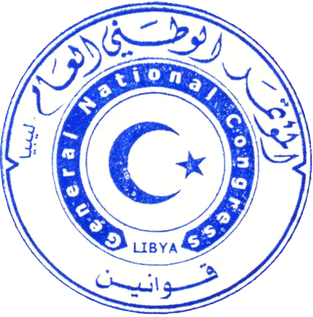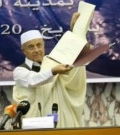Parliament of Libya may refer to:
- General People's Congress (Libya) (1977–2011)
- General National Congress (2012–2014, 2014–2016)
- House of Representatives (Libya) (since 2014)
- High Council of State (Libya) (since 2016)
Parliament of Libya may refer to:

Libya, officially the State of Libya, is a country in the Maghreb region in North Africa. It is bordered by the Mediterranean Sea to the north, Egypt to the east, Sudan to the southeast, Chad to the south, Niger to the southwest, Algeria to the west, and Tunisia to the northwest. Libya is made of three historical regions: Tripolitania, Fezzan, and Cyrenaica. With an area of almost 700,000 square miles, it is the fourth-largest country in Africa and the Arab world, and the 16th-largest in the world. Libya has the 10th-largest proven oil reserves in the world. The largest city and capital, Tripoli, is located in western Libya and contains over three million of Libya's seven million people.

The politics of Libya is in an uncertain state due to the collapse of the Libyan Arab Jamahiriya in 2011 and a recent civil war between the House of Representatives in Tobruk and its supporters, the New General National Congress in Tripoli and its supporters, and various jihadists and tribal elements controlling parts of the country. On 10 March 2021, a national unity government unifying the Second Al-Thani Cabinet of the House of Representatives and the Government of National Accord was formed, which will hold power until the next Libyan general election is held.

On 7 July 2012, the National Transitional Council, in power since the Libyan Civil War, supervised democratic elections for a 200-member General National Congress to replace the Council. The assembly was to choose a prime minister and organize parliamentary elections in 2013. A process to write a constitution was also to be determined. Unrest driven by armed militias, ethnic minority and radical groups undermined the process and the government for the years following the overthrowing of Muammar Gaddafi. While internal apathy towards democratic reforms slowed the process, external bodies such as the European Union were still pressing for the establishment of a national dialogue to build consensus for the drafting of a new constitution to take place before the end of 2014. Parliamentary elections were scheduled to be held on 25 June 2014 in a move aimed at stabilizing the country and quelling the unrest.

The Third International Theory was the style of government proposed by Muammar Gaddafi in the early 1970s, on which his government, the Great Socialist People's Libyan Arab Jamahiriya, was officially based. It was partly inspired by Islamic socialism, African nationalism and partly by the principles of direct democracy.
Mohamed Abu al-Qasim al-Zwai is a Libyan politician who was the last Secretary General of Libya's General People's Congress and thus the country's nominal head of state from 2010 until 2011. He replaced Imbarek Shamekh. As of 8 September 2011 he is in custody of the NTC forces.
General People's Congress may refer to:

Parliamentary elections were held in Libya on 25 June 2014 for the House of Representatives. Whilst all candidates ran as independents, the elections saw nationalist and liberal factions win the majority of seats, with Islamist groups being reduced to only around 30 seats. Election turnout was very low at 18%.

Mohammed Yousef el-Magariaf or, as he writes on his official website, Dr. Mohamed Yusuf Al Magariaf, is a Libyan politician who served as the President of the General National Congress from its first meeting in August 2012 until his resignation in May 2013. In this role he was effectively Libya's de facto head of state, until his resignation in May 2013.

The General National Congress or General National Council was the legislative authority of Libya for two years following the end of the First Libyan Civil War. It was elected by popular vote on 7 July 2012, and took power from the National Transitional Council on 8 August.
Libyan Parliament may refer to:

Nouri Abusahmain is a Libyan politician. He is a major figure on the Islamist side of the 2014 Libyan Conflict and founder of the LROR group which is considered "terrorist" by the internationally recognized Libyan parliament. He is reported to have rigged proceedings of the General National Congress while serving as its president.
Two coup d'état attempts were reported to have been made in 2014 by forces loyal to Maj. Gen. Khalifa Haftar, the commander of Libyan Ground Forces.

The Second Libyan Civil War was a multilateral civil war that lasted from 2014 to 2020 in the North African country of Libya fought between different armed groups, mainly the House of Representatives (HoR) and the Government of National Accord.

The Libya Shield Force is an armed organisation formed in 2012 out of anti-Gaddafi armed groups spread throughout Libya. The Libyan parliament designated much of the Libya Shield Force as terrorist and elements of the Libya Shield Force were identified as linked to al-Qaeda as early as 2012.

The Libyan House of Representatives (HoR) is the legislature of Libya resulting from the 2014 Libyan parliamentary election, which had an 18% turnout. In late 2014, following the failed coup attempt to take over the capital Tripoli in the context of the Libyan Civil War, the House of Representatives relocated itself to Tobruk in the far east of Libya. Several HoR sessions were held in Tripoli in May 2019 while Tripoli was under armed attack, electing an Interim Speaker for 45 days. Between 2014 and 2021, the House of Representatives supported the Tobruk-based government led by Abdullah al-Thani before supporting the incumbent Government of National Unity led by Abdul Hamid Dbeibeh. In September 2021, the House of Representatives passed a no-confidence motion against the interim Government of National Unity led by Abdul Hamid Dbeibeh.

Abdullah al-Thani is a Libyan politician who became prime minister of the House of Representatives of Libya on 11 March 2014, when he took over in an interim capacity after the dismissal of Ali Zeidan. He was previously the defence minister in the government of Zeidan.

The National Salvation Government was a government body formed by politicians from the General National Congress's blocs that lost the June 2014 elections in Libya. The NSG was led by Khalifa al-Ghawil. The term Libya Dawn Coalition was used to refer to the armed groups and/or the wider political movement supporting the NSG. The NSG was one of the major sides in the Second Libyan Civil War from its formation August 2014 until its dissolution in April 2016.

The Government of National Accord was an interim government for Libya that was formed under the terms of the Libyan Political Agreement, a United Nations–led initiative, signed on 17 December 2015. The agreement was unanimously endorsed by the United Nations Security Council, which welcomed the formation of a Presidency Council for Libya and recognized the Government of National Accord as the sole legitimate executive authority in Libya. On 31 December 2015, Chairman of the Libyan House of Representatives, Aguila Saleh Issa declared his support for the Libyan Political Agreement. The General National Congress has criticized the GNA on multiple fronts as biased in favor of its rival parliament the House of Representatives.